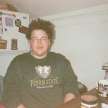Content warning
This story may contain sensitive material or discuss topics that some readers may find distressing. Reader discretion is advised. The views and opinions expressed in this story are those of the author and do not necessarily reflect the official policy or position of Vocal.

I’ve been reading a book of great importance to me. It’s not the content that’s important so much as the person the book belonged to, but we’ll get to that. This is perhaps the fifth or sixth time I have picked this book up and started through it. Sometimes I finish it, sometimes I don’t, sometimes I skip around and read only what I want. No matter the time I devote to it, I always find something new. David Foster Wallace had a way of doing that with his writing. Whether it’s because his sentences can take pages to reach a period, or his lexicon leaves you reaching for your dictionary every few words, or because the works he wrote were layered and complex, revealing small personal truths over a longer period of processing and digestion, DFW consistently makes people slow down and think. For better or worse, Wallace highlighted the most depraved aspects of humanity and his soul. Oblivion is no exception to this rule.
The stories aren’t my favorite. The themes and tone can be racist and sexist at worst or crass and indifferent at best. The writing is tedious and, at times, seemingly intentionally inaccessible. And for all the intellect and supposed awareness this writer possessed, he consistently failed to address the harm he inflicted on people in any meaningful way. He littered his fiction and essays with examples of how he treated partners, women of interest to him, and Others under the guise and protection of storytelling. Many would still laud him as a feminist writer for his stark depictions of misogynistic men. People would say he shone a light on toxic masculinity to critique it; some would declare it a glorification of his deep faults. I tend to agree with the latter.
For this reason, none of Wallace’s writing is my favorite. But, of his writings, I do have my favorites. “Incarnations of Burned Children,” from Oblivion, is at the top of the list. It still is rife with sexism, with the Mommy described as “hysterical,” while the “man’s mind” of the Daddy is described as “empty of everything but purpose.” The Mommy is “pointlessly” trying to help, and the Daddy is “moving quickly and well…” You get the point. Despite this, it is not without merit. Short and not very sweet, it depicts the unintended pain that parents inevitably cause their children and the moment that child learns to dissociate as a coping mechanism. “...the child had learned to leave himself and watch the whole rest unfold from a point overhead…” Wallace certainly knew plenty about suffering; his writing is his disclosure.
My friend Alex mailed me a copy of Oblivion nearly eight years ago. It is an heirloom copy with post-its and notes from the previous reader in the margins. This reader meant the world to many, including myself and Alex, so I studied this text and some others that I remembered the reader mentioning. From Works and Days and the Iliad to The Poetics of Space and Infinite Jest, I’ve done my best to read their favorites. All attempts to glean as much insight about the reader as possible. A process of understanding someone I was just getting to know.
While I don’t embrace Wallace for the myriad acts of violence he perpetrated against women, I do engage with him because the reader, Kellie, told me to.
Kellie Halushka was a young, brilliant, queer, and profoundly empathetic individual. A writer and avid reader, Kellie grappled with the universal and the personal, easily drawing connections between the two. Their commitment to community building was my first introduction to mutual aid efforts. We discussed genderqueer identities long before we were ready to come out ourselves. We raged against structural mechanisms of oppression that impacted us and our loved ones. Kellie drew these lines between our interior worlds and the political in ways that would make Carol Hanisch proud and most conservatives cringe. They also had bipolar disorder. Their written accounts of their experience with the disorder and the few stories they regaled me with helped me identify and receive my diagnosis. In many ways, despite being much younger, Kellie introduced me to and taught me about some of the most fundamental parts of myself and the world around me. They informed much of what has developed into my value system and identity. I admired and loved them deeply for the brief time I had with them and will, I suppose, for as long as I have the capacity for such cognitions.
I met Kellie at the end of 2015. They died in the summer of 2016. A tragically stupid and entirely avoidable accident at the corner of Fleet and Exeter, home to one of many Whole Foods in Baltimore. Men stole motorcycles and fled the scene of the crime at speeds estimated to have reached over 100mph. The Kawasaki that hit Kellie weighed roughly 465lbs. The force of that impact… when I first considered the math, I cried for days. The numbers crushed me in ways I wished I could experience somatically, a means to feel what Kellie may have felt in those final moments. The cause of the death was deemed pedestrian error.
I often wonder what Kellie would say about David Foster Wallace now. While there were reports of his stalking and abuse of women well before Kellie died, I don’t know what they knew about the extent of his harm. I assume not much, given what I know about Kellie. It wasn’t until 2018, after they died, the literary world gave their unmitigated enchantment with Wallace a serious second thought.
The #MeToo movement dramatically changed the landscape that people must navigate when attempting to seek justice against those who enact violence against them. Mary Karr was finally able to be taken seriously for revealing the terrible abuses of a deeply troubled man. Wallace, although posthumous, was finally knocked from the pedestal he may or may not have deserved in the first place.
And finally, there was peace in the land.
I jape. There is still much work for us to do.
The harsh realities of life as someone assigned female at birth were not lost on Kellie. Incisively, they tore apart the gender binary and the prescribed roles that dictate the truncation of both male and female experiences. While they never formally came out to me, they alluded to being non-binary, as I did to them. Their bisexuality and androgyny were apparent but never centered in their understanding of Self. My teacher, Kellie, taught me about degendering clothing and fashion, and I echoed their frustrations with double standards and double binds. The comfort they exhibited in their body inspired me to find comfort in mine.
We did drugs together. Frequently. It was an activity that tied me to many in dangerous and disingenuous ways, but it never felt like that with Kellie. They were emotionally safe, kind, and compassionate. Reckless, yes, but reasonable. The last time I saw them, we were tripping on acid, wandering around my college campus in the middle of the night, singing to the stars, and dancing in the fountains. We planned on hanging out again before they left for Baltimore to visit Alex, but I flaked that night. They left the following day, and I never saw them again.
“If you’ve never wept and want to, have a child.” Wallace closes Incarnations with this sentiment, something I have thought about constantly since Kellie died. They were only twenty—an only child. I spend time with their parents to this day. We cry whenever we are together. I can only imagine how much they weep alone.
Alex told me that “Incarnations of Burned Children” was Kellie’s favorite in Oblivion, too. I understand why. It is an apt metaphor for our deepest wounds suffered at the hands of those who are supposed to love us most. Like all of us fortunate enough to bear the burden of existence, Kellie was wounded. Though, for all their pain and suffering, their consideration of others never faltered.
I think I have a good idea of what Kellie would say about DFW now. They might ask, “Remember when Infinite Jest was my favorite book?” Then, they would almost certainly cleverly castigate the story and the type of person who reads it while acknowledging some of their Beatnik values, which attracted them to the text in the first place. Their devilish smirk would signal their self-awareness and cheek. I would laugh and pass them the joint.
About the Creator
kp
I am a non-binary, trans-masc writer. I work to dismantle internalized structures of oppression, such as the gender binary, class, and race. My writing is personal but anecdotally points to a larger political picture of systemic injustice.
Enjoyed the story? Support the Creator.
Subscribe for free to receive all their stories in your feed. You could also pledge your support or give them a one-off tip, letting them know you appreciate their work.







Comments
There are no comments for this story
Be the first to respond and start the conversation.